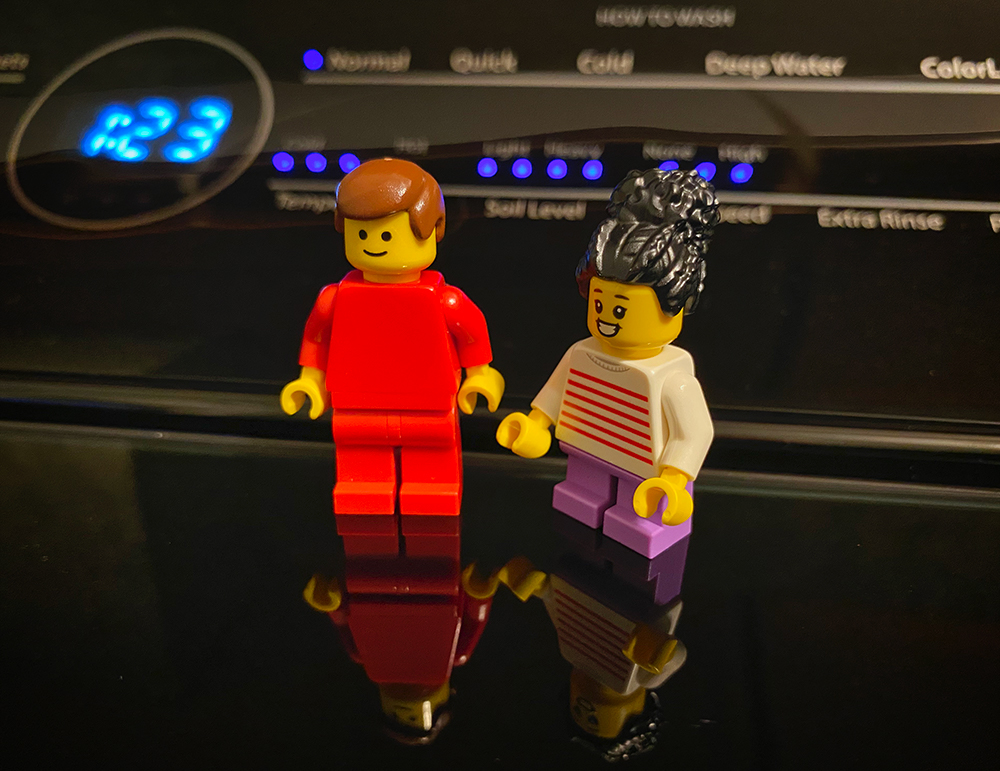“Go on home, your mother is calling.
Your father is caught in the washing machine.
Go on home, your mother is calling.
She can not get your clothes clean.”
We used to sing this song when we were kids. We sang a lot of catch little ditties like this one, thanks to my Dad. He had a million of them. But when we sang this one, we always laughed a little because it might be true.
I don’t know when it happened, but we always had two washers and two dryers. There were seven kids, after all. Dirty kids. But my Dad worked at Frigidaire. He was a design engineer in the refrigeration department. However, that gave him license to fix all the other major appliances in the house I supposed. He engineered those things, and I guess he had an understanding of which nut went with what bolt. I can remember going down the basement when one of the washers was broken, and Dad had the guts of that thing lying all over the basement floor. “Don’t come down here,” he’d say in a gentle voice.
This ability of his led him into other people’s homes at times. Mostly fellow parishioners or neighbors. Give Paul Kronenberger a call, he knows how to fix those things. It didn’t happen a lot, but he would always go and help, joyfully. Some people are kind in that manner. They go and help others when there is a need.
But all of this came to mind because it was on this date in 1858, a man named Hamilton Smith patented the rotary washing machine. In Pittsburgh, of all places. I suppose with all the steelworkers up there, a lot of dirty clothes were in need of washing.
I was going to tell you the story of how Hamilton Smith came to invent the rotary washing machine, but there is another Hamilton Smith, born much later in 1931. That guy is an American microbiologist and Nobel laureate. He clutters the Google right out of OUR Hamilton Smith, machine washer guy extraordinaire.
Yet, washing clothes has been around for centuries. In ancient times, it had some rather interesting twists. No pun intended. The first recorded method of doing laundry comes from the time of the ancient Romans. And those Romans made some nifty detergent. It consisted of the fat of sacrificed animals mixed with ash. It gets worse. Another popular method was to tread on their submerged laundry. But the liquid used in the process was fermented human urine. The high concentration of ammonia in the urine effectively sanitized the clothing. I’m sure it smelled, oh-so-pleasant, too. Their last way of doing laundry has shown up in movies, where people would scrub their clothes with abrasive sands or pound them on rocks in the local streams.
I bet the urine-treaders were the first ones to invent a better way.
But jump ahead to the industrial revolution. Two Americans, James King in 1851, and our Hamilton Smith in 1858, received patents for similar devices that historians sometimes cite as the first true “modern” washers.
Today, over 85 percent of the nation’s households have a washing machine. And for the rest? Currently, there are about 29,500 coin laundries in the United States. Those laundromats generate about $5 billion in gross revenue annually. Of course, clean clothes are considered a necessity of life.
The necessities of life. These are something a lot of people take for granted, yet, an alarming number of people — here in the United States and worldwide — do not have. A traditional list of immediate “basic needs” is food (including water), shelter, and clothing. And now, many modern lists emphasize a new minimum level of consumption. These ‘basic needs’ are expanded to include sanitation, education, and healthcare. And we know, different agencies use different lists, all of this influenced by politics.
Perhaps we should all be thankful every time we do laundry. Because some people can’t.
And to think, I was lucky enough to have a song to go along with it, when I was a little girl.
==========
“You can’t always get what you want, but if you try sometimes, you might find, you get what you need.”
― Mick Jagger
=========
Earth provides enough to satisfy every man’s needs, but not every man’s greed.”
― Mahatma Gandhi
=========
“Is this thing safe?”
“Safe as life,” Gansey replied.”
― Maggie Stiefvater, The Raven Boys
=========
The biggest spin cycle of all.
